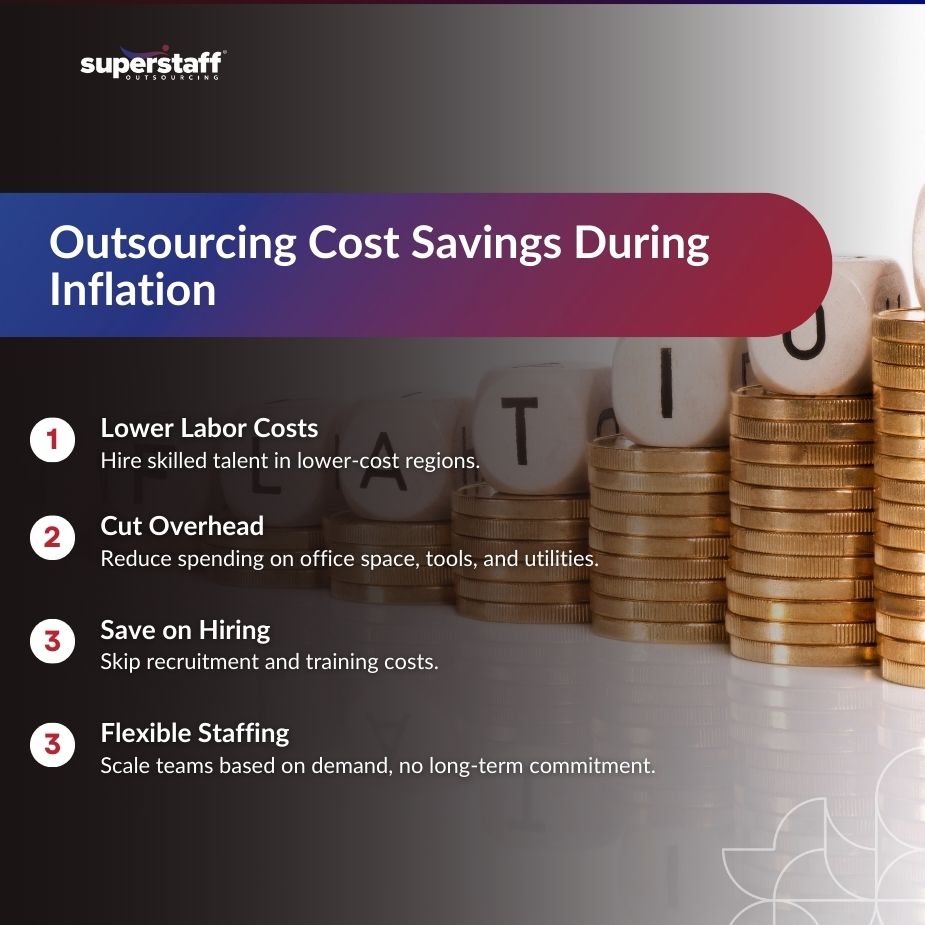
Inflation affects every part of a business — salaries, supplies, office rent, and more. For companies trying to control costs, the pressure is real. How do you stay competitive when your expenses keep going up?
One method that has worked for years is outsourcing. But with global inflation pushing up wages and material costs, many are asking: Does outsourcing still make sense? Is the promise of outsourcing cost savings still reliable?
The short answer: Yes — if used the right way.
This article explains how outsourcing cost savings are still possible, even during inflation. You’ll see how shifting certain tasks can help cut costs, support flexible growth, and keep your budget in check.
Inflation Is Raising Costs Everywhere
Inflation isn’t limited to just one area. It affects everything your business depends on. Here’s how:
- Labor Costs: With fewer workers available in some industries, wages are going up fast.
- Office Expenses: Rents, utilities, and equipment costs have increased.
- Operational Budgets: Businesses in many sectors are cutting back, trying to make each dollar go further.
When every line item becomes more expensive, you need to find smarter ways to manage your spending.
How Outsourcing Can Reduce Business Expenses During Inflation

Outsourcing cost savings still hold up, even as inflation drives up prices globally. By outsourcing, companies can shift operations to regions with lower labor costs or reduce their need for physical space and full-time staff.
1. Lower Labor Costs
Outsourcing to offshore or nearshore providers lets you tap into skilled labor at more affordable rates. Countries like the Philippines, Mexico, and India offer strong talent pools with lower wage demands, making it easier to achieve outsourcing cost savings.
2. Fewer Overhead Costs
Remote teams eliminate the need for additional office space and related costs. One estimate noted office space averaged $7,459 per employee per year in the U.S., while high-rent markets can exceed $24,000 per seat annually. Outsourced teams often work remotely. This means:
- No need to rent extra office space
- Less investment in computers, desks, or other tools
- Lower utility bills
These reductions directly support outsourcing cost savings.
3. Reduced Hiring and Training Costs
Hiring, onboarding, and training new employees can be expensive. When you outsource, the service provider handles those tasks. You avoid long hiring processes and reduce the risk of turnover-related costs.
4. Flexible Staffing Options
Outsourcing offers scale-on-demand. You can:
- Add staff during busy periods
- Reduce staff during slow seasons
- Avoid long-term salary and benefit commitments
This flexibility enhances outsourcing cost savings, especially for small and midsize businesses managing rising expenses.
Business Areas Where Outsourcing Still Saves You Money
Let’s break down the cost-saving benefits of outsourcing by department during economic downturns. Many companies are seeing measurable savings in these areas:
1. Customer Service
Customer service operations benefit from lower call handling costs. Offshore centers typically charge less per interaction, and businesses can extend service hours without paying overtime.
2. Finance and Accounting
In finance and accounting, tasks like bookkeeping, invoicing, and payroll are essential but time-consuming. Outsourcing helps reduce labor costs and improve accuracy through experienced remote professionals.
3. IT Support
IT support is often more affordable when outsourced. Remote teams provide around-the-clock assistance, and companies only pay for the specific level of help they need.
4. Data Entry and Admin Tasks
Data entry and admin work are ideal for outsourcing. These repetitive, high-volume tasks can be completed faster and at a lower cost, while in-house teams stay focused on higher-value responsibilities.
These real-world examples show that outsourcing cost savings are not just a theory — they happen every day.
When Outsourcing Works — and When It Doesn’t
While outsourcing offers strong financial benefits, it doesn’t work automatically. You need a plan.
What Makes Outsourcing Deliver Results?
- Clear Job Roles: Outsourcing works best when tasks are well-defined and repeatable. When each team member knows exactly what to do, productivity increases and errors are minimized.
- Trusted Providers: A reliable outsourcing partner ensures consistent quality. Working with an experienced provider builds confidence and helps maintain brand standards.
- Standardized Workflows: Structured processes make training newbies faster, easier to scale, and reinforce outsourcing cost savings.
- Strong Oversight: Regular check-ins and clear KPIs help you track results. Monitoring performance closely allows for quick adjustments and keeps the project aligned with goals.
When done well, outsourcing improves performance and supports a positive outsourcing ROI.
What to Watch Out For
- Hidden Costs: Transitioning work can take time and resources.
- Poor Vendor Fit: If the outsourcing partner doesn’t understand your needs, you could lose time and money.
- Lack of Communication: Gaps in communication can slow down results or reduce quality.
Knowing both the strengths and limits of outsourcing helps you avoid costly mistakes.
Who Should Consider Outsourcing Right Now?
Not every business needs outsourcing, but many can benefit from it, especially under financial pressure.
Here’s who should consider outsourcing:
1. Startups and Small Businesses
If you’re trying to grow without fixed costs, outsourcing gives you flexibility. You can run operations with a lean in-house team while outsourcing support work.
2. Companies Entering New Markets
Need help with local support, customer service, or operations in a new region? Outsourcing allows quick expansion without big commitments.
3. Businesses with Seasonal Demand
If your workload rises and falls throughout the year, outsourcing helps manage the ups and downs without overhiring.
4. Firms Facing Local Hiring Challenges
When you can’t find the right people locally, outsourcing opens access to global talent.
For these companies, outsourcing cost savings are not just helpful, they’re necessary.
Outsourcing Still Helps You Save
Inflation is raising the cost of wages, office space, and operations, but outsourcing cost savings remain reliable.
Outsourcing helps cut payroll, reduce overhead, and avoid long recruitment cycles. Businesses can access trained talent without extra hiring or training costs.
It also supports flexible staffing. Companies can scale up or down without taking on fixed expenses.
From customer service to IT, finance, and admin support, outsourcing offers real savings. It also helps improve efficiency and boost outsourcing ROI.
Need to manage costs without lowering service quality? SuperStaff provides tailored solutions that show how outsourcing can reduce business expenses during inflation.






